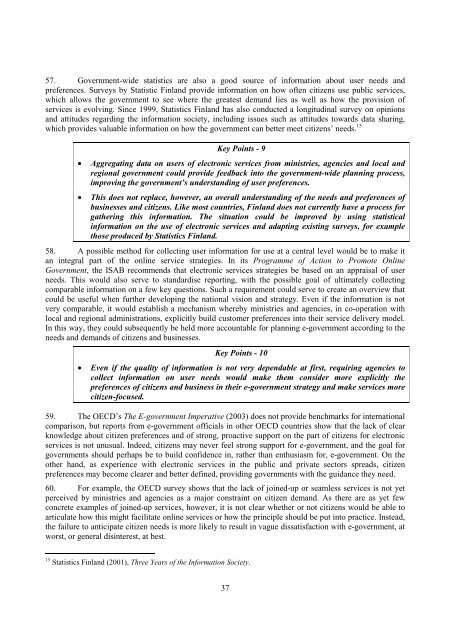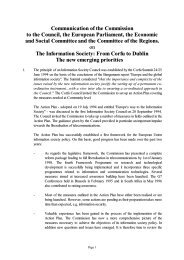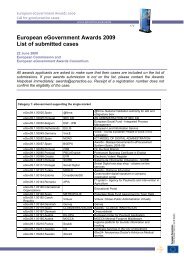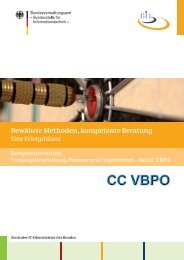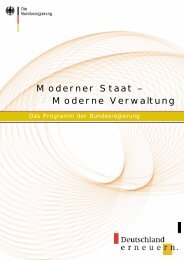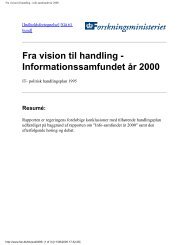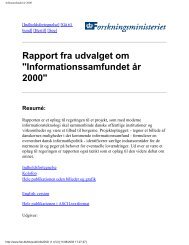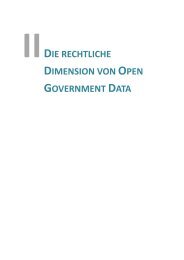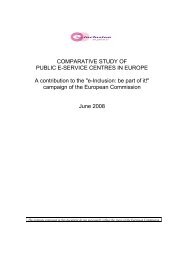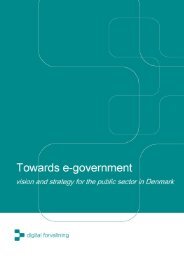e-GOVERNMENT IN FINLAND - ePractice.eu
e-GOVERNMENT IN FINLAND - ePractice.eu
e-GOVERNMENT IN FINLAND - ePractice.eu
You also want an ePaper? Increase the reach of your titles
YUMPU automatically turns print PDFs into web optimized ePapers that Google loves.
57. Government-wide statistics are also a good source of information about user needs and<br />
preferences. Surveys by Statistic Finland provide information on how often citizens use public services,<br />
which allows the government to see where the greatest demand lies as well as how the provision of<br />
services is evolving. Since 1999, Statistics Finland has also conducted a longitudinal survey on opinions<br />
and attitudes regarding the information society, including issues such as attitudes towards data sharing,<br />
which provides valuable information on how the government can better meet citizens’ needs. 15<br />
Key Points - 9<br />
x Aggregating data on users of electronic services from ministries, agencies and local and<br />
regional government could provide feedback into the government-wide planning process,<br />
improving the government’s understanding of user preferences.<br />
x This does not replace, however, an overall understanding of the needs and preferences of<br />
businesses and citizens. Like most countries, Finland does not currently have a process for<br />
gathering this information. The situation could be improved by using statistical<br />
information on the use of electronic services and adapting existing surveys, for example<br />
those produced by Statistics Finland.<br />
58. A possible method for collecting user information for use at a central level would be to make it<br />
an integral part of the online service strategies. In its Programme of Action to Promote Online<br />
Government, the ISAB recommends that electronic services strategies be based on an appraisal of user<br />
needs. This would also serve to standardise reporting, with the possible goal of ultimately collecting<br />
comparable information on a few key questions. Such a requirement could serve to create an overview that<br />
could be useful when further developing the national vision and strategy. Even if the information is not<br />
very comparable, it would establish a mechanism whereby ministries and agencies, in co-operation with<br />
local and regional administrations, explicitly build customer preferences into their service delivery model.<br />
In this way, they could subsequently be held more accountable for planning e-government according to the<br />
needs and demands of citizens and businesses.<br />
Key Points - 10<br />
x Even if the quality of information is not very dependable at first, requiring agencies to<br />
collect information on user needs would make them consider more explicitly the<br />
preferences of citizens and business in their e-government strategy and make services more<br />
citizen-focused.<br />
59. The OECD’s The E-government Imperative (2003) does not provide benchmarks for international<br />
comparison, but reports from e-government officials in other OECD countries show that the lack of clear<br />
knowledge about citizen preferences and of strong, proactive support on the part of citizens for electronic<br />
services is not unusual. Indeed, citizens may never feel strong support for e-government, and the goal for<br />
governments should perhaps be to build confidence in, rather than enthusiasm for, e-government. On the<br />
other hand, as experience with electronic services in the public and private sectors spreads, citizen<br />
preferences may become clearer and better defined, providing governments with the guidance they need.<br />
60. For example, the OECD survey shows that the lack of joined-up or seamless services is not yet<br />
perceived by ministries and agencies as a major constraint on citizen demand. As there are as yet few<br />
concrete examples of joined-up services, however, it is not clear whether or not citizens would be able to<br />
articulate how this might facilitate online services or how the principle should be put into practice. Instead,<br />
the failure to anticipate citizen needs is more likely to result in vague dissatisfaction with e-government, at<br />
worst, or general disinterest, at best.<br />
15 Statistics Finland (2001), Three Years of the Information Society.<br />
37


